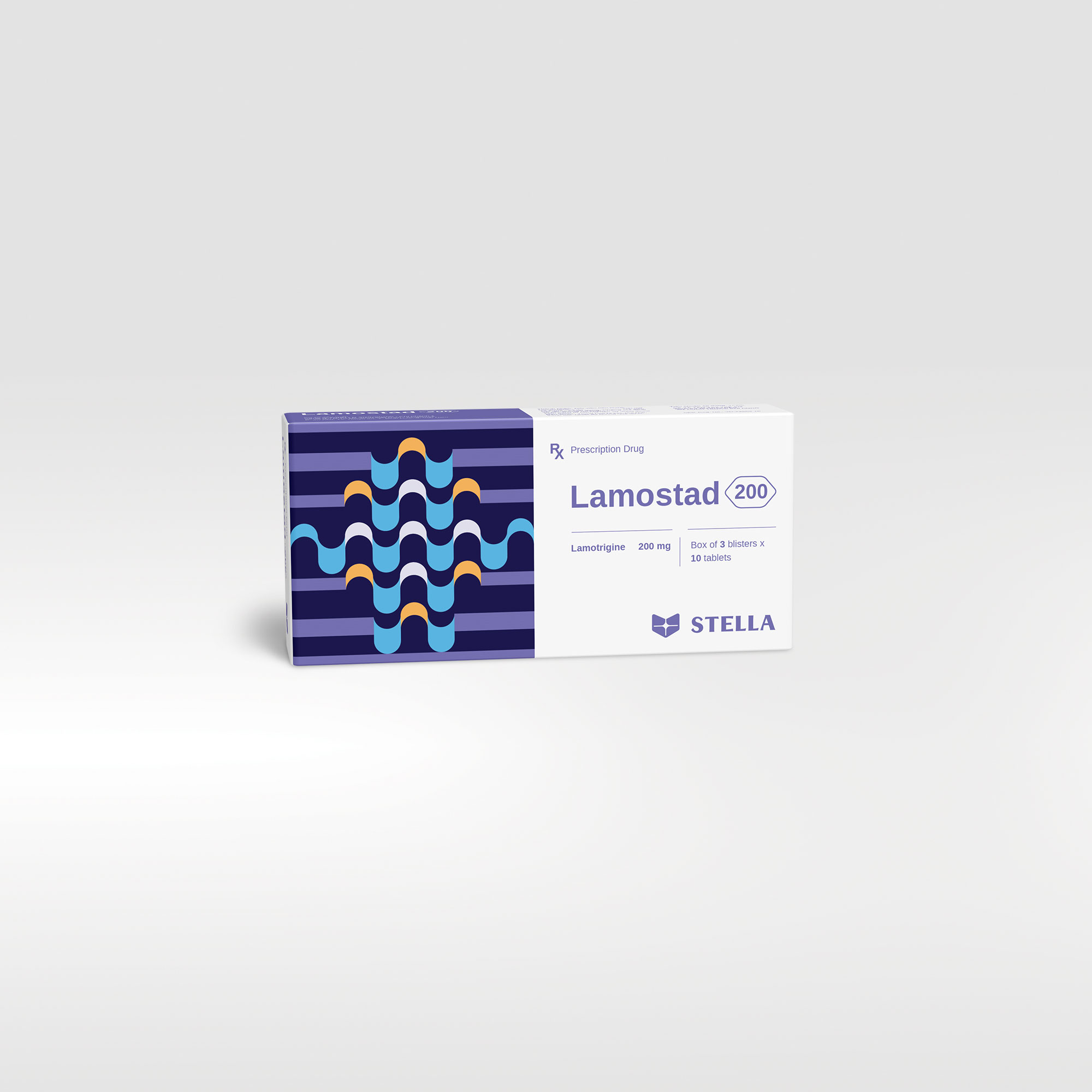Indications:
Epilepsy
Adults and children over 12 years of age:
- Adjunctive or monotherapy treatment of partial seizures and generalised seizures, including tonic-clonic seizures.
- Seizures associated with Lennox-Gastaut syndrome.
Children aged 2 to 12 years:
- Adjunctive treatment of partial seizures and generalised seizures, including tonic-clonic seizures and the seizures associated with Lennox-Gastaut syndrome.
- Monotherapy of typical absence seizures.
Bipolar disorder
Adults aged 18 years and above: Prevention of depressive episodes in patients with bipolar I disorder who experience predominantly depressive episodes.
Dosage:
Epilepsy
Monotherapy:
Adults and children > 12 years of age: Initial with 25 mg, once a day x 2 weeks; thereafter 50 mg, once a day x 2 weeks, then should increase, maximum of 50 – 100 mg every 1 – 2 weeks; maintain: 100 – 200 mg daily, once or two divided doses.
Add-on therapy:
Adults and children > 12 years of age:
- In patients taking valproate with/ without any other antiepileptic drug: Initial with 25 mg on alternate days, in 2 weeks; thereafter 25 mg once a day in 2 weeks, then should increase, maximum of 25 – 50 mg every 1 – 2 weeks; maintain: 100 – 200 mg daily, once or two divided doses.
- In those patients taking concomitant AEDs or other medications that induce lamotrigine glucuronidation with/ without other AEDs (except valproate): Initial with 50 mg, once a day x 2 weeks; thereafter 100 mg, two divided doses, in 2 weeks, then should increase, maximum of 100 mg every 1 – 2 weeks; maintain: 200 – 400 mg daily, two divided doses.
- In those patients taking oxcarbazepine without any other inducers or inhibitors of lamotrigine glucuronidation: Initial with 25 mg, once a day x 2 weeks; thereafter 50 mg , once a day x 2 weeks, then should increase, maximum of 50 – 100 mg every 1 – 2 weeks until the optimal response is achieved; maintain: 100 – 200 mg daily, once or two divided doses.
Children 2 – 12 years:
- In patients taking valproate with/ without any other antiepileptic drug: Initial with 0.15 mg/kg daily, once a day x 2 weeks; thereafter 0.3 mg/ kg daily x once a day x 2 weeks, then should increase, maximum of 0.3 mg/kg every 1 – 2 weeks; maintain: 1 – 5 mg/kg daily, once or two divided doses.
- In those patients taking concomitant AEDs or other medications that induce lamotrigine glucuronidation with/ without other AEDs: Initial with 0.6 mg/kg daily, two divided doses in 2 weeks; thereafter 1.2 mg/ kg daily, two divided doses in 2 weeks, then should increase, maximum of 1.2 mg/kg every 1 – 2 weeks; maintain: 5 – 15 mg/kg daily, two divided doses.
- In those patients taking oxcarbazepine without any other inducers or inhibitors of lamotrigine glucuronidation: Initial with 0.3 mg/kg daily once or two divided doses in 2 weeks; thereafter 0.6 mg/ kg daily, once or two divided doses in 2 weeks, then should increase, maximum of 0.6 mg/kg every 1 – 2 weeks. Maintain: 1 – 10 mg/kg daily, once or two divided doses, maximum of 200 mg daily.
Bipolar disorder
- Monotherapy with lamotrigine or adjunctive therapy without valproate and without inducers of lamotrigine glucuronidation: initial 25 mg, once a day in 2 weeks; thereafter 50 mg once or two divided doses in 2 weeks; increase to 100 mg, once or two divided doses in 5th week; target stabilisation dose* of 200 mg, once or two divided doses in 6th
- Adjunctive therapy with valproate (inhibitor of lamotrigine glucuronidation): initial 25 mg on alternate days in 2 weeks; thereafter 25 mg, once a day x 2 weeks; increase to 50 mg once or two divided doses in 5th week; target stabilisation dose* of 100 mg, once or two divided doses in 6th week. Maximum dose of 200 mg daily depending on clinical response.
- Adjunctive therapy without valproate and with inducers of lamotrigine glucuronidation: initial 50 mg, once a day in 2 weeks; thereafter 100 mg, two divided doses in 2 weeks; increase to 200 mg, two divided doses in 5th week; target stabilisation dose* of 300 mg, two divided doses in 6th week, may alter depending on clinical response; to achieve optimal response: 400 mg daily, two divided doses in 7th
Adjustment of lamotrigine daily dosing following the addition of inducers of lamotrigine glucuronidation:
- If current lamotrigine stabilisation dose is 200 mg daily: 1st week: 200 mg daily; 2nd week: 300 mg daily; 3rd week onwards: 400 mg daily.
- If current lamotrigine stabilisation dose is 150 mg daily: 1st week: 150 mg daily; 2nd week: 225 mg daily; 3rd week onwards: 300 mg daily.
- If current lamotrigine stabilisation dose is 100 mg daily: 1st week: 100 mg daily; 2nd week: 150 mg daily; 3rd week onwards: 200 mg daily.
Adjustment of lamotrigine daily dosing following the withdrawal of inducers of lamotrigine glucuronidation:
- If current lamotrigine stabilisation dose is 400 mg daily: 1st week: 400 mg daily; 2nd week: 300 mg daily; 3rd week onwards: 200 mg daily.
- If current lamotrigine stabilisation dose is 300 mg daily: 1st week: 300 mg daily; 2nd week: 225 mg daily; 3rd week onwards: 150 mg daily.
- If current lamotrigine stabilisation dose is 200 mg daily: 1st week: 200 mg daily; 2nd week: 150 mg daily; 3rd week onwards: 100 mg daily.
(*The target stabilisation dose will alter depending on clinical response; maintain this dose following the addition/ withdrawal of medicinal products that do not significantly inhibit or induce lamotrigine glucuronidation.)
Patients with moderate to severe hepatic impairment: dosage reduced by approximately 50% to 75%, end-stage renal failure: reduced maintenance doses.
Usage:
Lamostad 200 tablets should be swallowed whole and not be crushed or chewed


